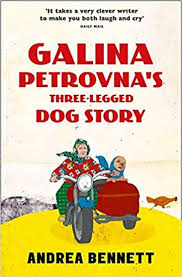
Russia in Fiction has reminded readers often enough that the reviews on this blog ask two questions of every book. What is the book like? And how does it portray Russia?
Galina Petrovna’s Three-Legged Dog Story unquestionably knows its Russia. Andrea Bennett falls into the category of authors who lived in Russia in the unforgettable chaos of the 1990s. Just as did Sophia Creswell, Anna Blundy, and A.D. Miller, Andrea Bennett successfully draws on that experience in writing memorable fiction.
And as for what the book is like? Galina Petrovna’s Three-Legged Dog Story summons up the sometimes joyous, sometimes tragic disorder of the immediate post-Soviet years in a slightly surreal yet recognisably realistic comic tale.
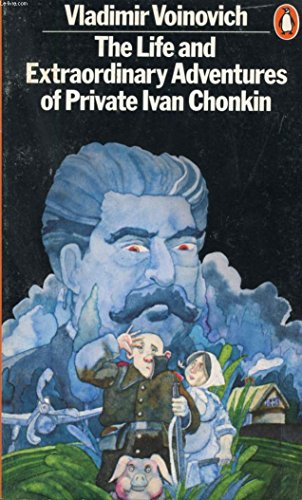
For aficionados of Soviet literature —and, as ever on the Russian in Fiction blog, without wanting to draw too close a comparison— Andrea Bennett’s story brought to mind Vladimir Voinovich’s literary romp, set in World War II, The Life and Extraordinary Adventures of Private Ivan Chonkin (1977).
Like The Life and Extraordinary Adventures of Private Ivan Chonkin, Galina Petrovna’s Three-Legged Dog Story starts in provincial Russia in an historically notable time. In the former it is the summer of 1941 and war is about to be declared. In the latter it is the summer of 1994 and the collapse of the Soviet Union —albeit nearly three years earlier— has left the people of Russia seeking some sense of normality and stability. But in neither novel are these grand geopolitical moments much more than setting. They are the vivid background against which the small-scale lives of the novels’ characters play out.
Widowed babushka Galina Petrovna’s three-legged dog has been grabbed by the local dog-catcher, a young social misfit by the name of Mitya the Exterminator, who loves Depeche Mode and hates dogs. Retired teacher Vasya, who runs the Azov House of Culture Elderly Club once a week and has a soft spot for Galina, tries to help but only ends up getting himself arrested and thrown into the local remand prison — the SIZO (Sledstvenny Izolyator). But Galina’s best friend Zoya, like many a Soviet/Russian citizen, has connections. In her case these connections come in the form of Grigory Mikhailovich, a former senior figure in the Soviet governing structures who still —despite his age and apparent confusion— retains official clout.
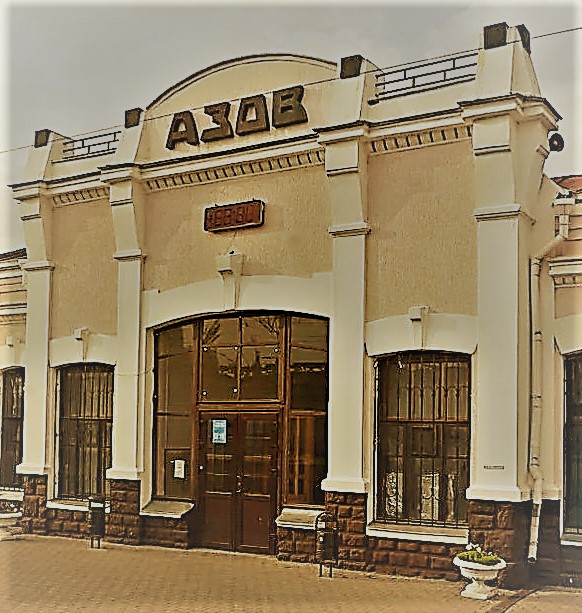
So Galina and Zoya board the train to Moscow from their home in the town of Azov in south-west Russia, intent on securing Grigory Mikhailovich’s help to gain the release of both Vasya and the three-legged dog.
That is the novel’s set-up; less than a third of its 300+ pages. The remainder take the reader on an exuberant ride through subplots, deeper characterisations, and a playlike final scene in which the principal figures arrive together in one room to tie up loose ends and bring matters to a conclusion.
Throughout, Andrea Bennett’s writing is comic in style even whilst its themes are not necessarily light. And from the Russia-in-fiction perspective, Bennett provides detail and description that show knowledge not just of Russian history or politics or society, but —most strikingly— of everyday life.
Anyone who lived in Russia in those years will recognise her vividly drawn world —food, living spaces, travel, attitudes to authority, bolshy babushkas, alcoholics, disinterested officials, the importance of svyazi (connections). These and more are all there in the mix of shocked loss and potential new opportunity that marked the immediate post-Soviet years.
Galina Petrovna’s Three-Legged Dog Story evokes its setting with instinctive immediacy. This is a book that smells of provincial Russia in the 1990s. Its words are photographs of time and place. Put your ear to its pages and you will hear post-Soviet Russian life and the voices of extraordinary everyday Russian people.
‘A tiny old woman with a bristling chin and a brightly coloured headscarf darted out of the stairwell’
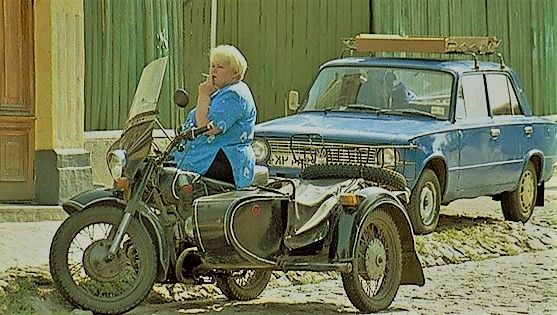
‘Vasya’s ancient but gleaming Ural motorbike and sidecar’
‘A hearty picnic of hard-boiled eggs, dried fish, best Doktorskaya sausage, two loaves of brown bread, fresh tomatoes, parsley and apricots from the vegetable patch, a litre of kefir and two bottles of cold tea’

‘Steaming tea, accompanied by sugar lumps wrapped in paper bearing the state railway insignia of a winged hammer and sickle, was duly delivered a little later by the grinning stewardess’
‘High ceilings with moulded roses and real crystal chandeliers; caramel-coloured parquet that gulped down the clack of footsteps; respectable oak doors that swung languidly into each lofty room, and windows stretching to the ceiling with five inch double-glazing.’
Andrea Bennett has a gift for drawing vivid Russian scenes.
The convivial food-sharing and story-swapping of strangers becoming temporary companions in the compartment of a train taking a day and a night to reach Russia’s capital city.
The comic incongruity of three essentially Soviet pensioners visiting an early 1990s Moscow nightclub.
The patient stand-off between determined Russian citizens and a junior government official as the former —refusing to bribe— sit for hours on the smooth wooden benches of a ministerial reception room, whilst the latter, guarding access from behind his desk, waits them out.
Occasionally such miniature portrayals give way to broader descriptions. Galina, as many a provincial Russian of her generation, has visited Moscow only rarely and is struck by the contrast between the Soviet and post-Soviet versions of the capital city.
Over 20 years before, Galia had visited Moscow on a work’s cultural trip. She had been rushed past Red Square and Lenin’s tomb, the Moscow Museum and the Kremlin. The glinting ancient monuments studded with modern memorials to the glory of the Soviets had intrigued her, the warm rosy flesh of reality replacing the black and white bones of pictures that had smattered the pages of shared books at school …
But the visit had largely been spoilt by the efforts of their zealous guide. She felt herded as her group moved, as a single unit, from one-stop to the next, with no time for questions, or individual exploration, or even for talk between the holidaymakers …
The hotel was full of roaches and inedible food, bad smells and rude staff …
Now, in the 1990s, it was even worse. The Metro was bursting with adverts full of women with huge white teeth and disposable nappies. Every poster on every street corner was trying to sell citizens shares in this or that diamond mine, oil company or chocolate factory. The roads, be they sweeping boulevards or the narrow crooked lanes that strain to connect them, were crammed with filthy cars jostling for position, and none of them going anywhere. The shops in the city centre were bursting with the kind of things that few honest people could afford, and no one needed. And in among all the grandeur and the twenty-four-hour consumption, old ladies stood in ragged rows around Metro stations, trying to sell any old thing in order to buy a crust of bread: a single shoe; some well-used laces; a spoon.
Galina Petrovna’s Three-Legged Dog Story, pp. 167-168
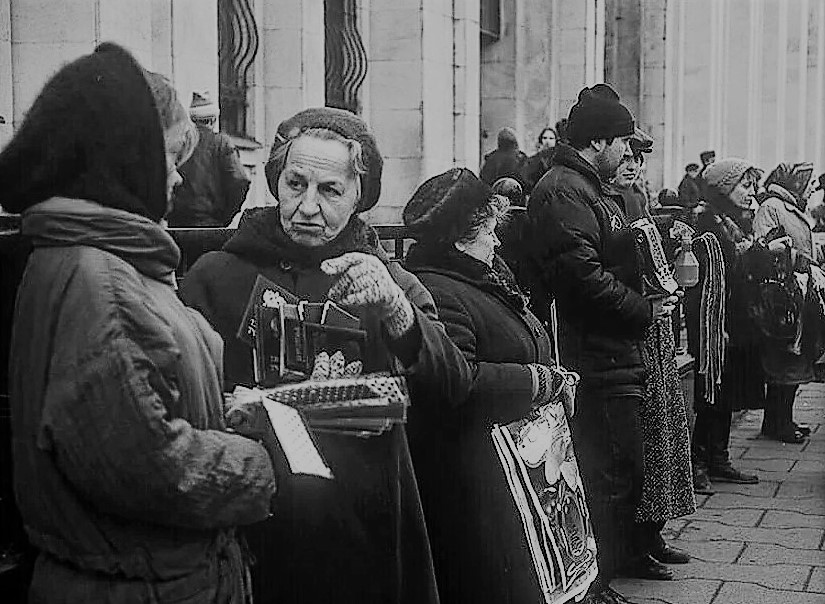
There is little in the way of politics, except for our short introduction to Grigory Mikhailovich, the elderly former Soviet official still somehow living in his spacious Moscow apartment and retaining influence and a few privileges.
Grigory Mikhailovich wants the Soviet Union back. A discussion of Lenin sends him into a surreally comic rant.
‘They preserved his brain though. This I know. It is no fairy story. It is there, with the boffins, under the Kremlin … We can reanimate him … And we must! It is our duty!
That bloody Yeltsin. Standing on that tank in ’91, cheering them on. Kill the Soviet Union! Kill it! Independence for all! Drunken bloody Urals bastard … Our brothers and sisters of the Soviets died for the cause. They donated their lives in their thousands to enrich the Soviet Union and he sold their bones for a bottle of vodka. He sold his mother for a shot and his granny for a gherkin. The dirty Urals bastard! Lenin would be turning! We have to raise him up! …
And that bloody perestroika. Perestroika my arse. What idiot thought up perestroika? Ahh, what was his name? Grom … No, not him… Pri … No, it’ll come to me. Anyway, we didn’t need Perestroika, we needed Lenin. He had guts and brains! Before, I mean, when he had real guts and brains, not wax guts, ha! No, he had guts! And a brain!
Galina Petrovna’s Three-Legged Dog Story, pp. 85-86
Andrea Bennett has written a somewhat surreal novel from the perspective of plot that is innately real when it comes to setting. Its portrayal of Russia in fiction exists in a different world from thrillers and crime stories, from the Moscow-centric and élite-level works that make up most of the books reviewed on this blog. Galina Petrovna’s Three-Legged Dog Story is a splendidly original comic tale; a riotous frolic revelling in a memorably fleeting period of Russian life.